Unit 11 How was your school trip导学案
人教版七年级下册英语导学案Unit11Howwasyourschooltrip

人教版七年级下册英语导学案Unit11HowwasyourschooltripUnit 11 How was your school trip?Period 1Section A(1a~2c)自主学习课前诊断温故知新Ⅰ. 写出下列动词的过去式1. go_______2. milk_____3. ride______4. Feed_____5. have_____6. see______7. take______8. do______9. is_______ 10. are______Ⅱ. PairworkA: What did you do last week?B: I went to the zoo ….设问导读二Task 1: Teacher shows some photos: went for a walk, milked a cow, rode a horse, fed a horse, fedchickens, took some photos …Pairwork.A: What did you do last week?B: I went for a walk.Task 2: Please read your list to the class (1a).Task 3: Listen and finish 1b.Task 4: Pairwork (1c).A : Did Carol take any photos?B: Yes, she did.Task 5: Listen and finish 2a and 2b.Task 6: Pairwork (2c).A: What did Carol do?B : She picked some strawberries.三.自学检测单项选择( )1. —___ you at home this morning?—No, I _____.A. Were; wasn'tB. Were; weren'tC. Was; wasn'tD. Was; weren't)2. He __ any classes last week. (C. isn't havingD. wasn' A. doesn't have B. didn't have t haveDo they _____TV every Sunday?—( )3.t ____TV last Sunday. '—No. They didnC. watch; watched D. watched; watch B. watched; watched A. watch; watch )4. Jim enjoys ___ very much. (D. to play soccer B. playing soccer A. play the soccer C. playing the soccer)5. Where did your brother ____ last night?(D. do A. go B. went C. going互动学习问题解决写出下列动词的过去式。
人教新目标英语七下unit11《Howwasyourschooltrip》period3导学案

Unit 8 How was your school trip Period 3Step 1 Revision and lead inGreet the class as usual and check the homework.T: Do you remember what Class 9 did on their school trip? Who can retell the story to us? Ladies, first!Show the pictures on the screen again. These will help the students to remember the main events.Sample version:On the last schoo l trip the students from Class 9 had a wonderful time. They went to Blue Water Aquarium. They visited the Visitors’Center and watched a movie about sharks. Then they watched a dolphin show. It was very interesting. Next they went to the Outdoor Pool and saw a big octopus. After lunch they went to the Gift Shop and bought lots of souvenirs. Finally they went back to school by bus. The class monitor cleaned the bus after th e trip. The driver and the teacher were very happy. T: Yesterday, we learned about what Tina and Tony did on their last day off. What was their last day off like? Was it a good day off?Ss: No, it was awful. (It was terrible.)T: Today, we will learn something about Nick and Tim’s day off. Did they have a good day off or a terrible day off? Make a guess.Ss: ...Step 2 Reading (Section B 3a)T: Turn to page 51, activity 3a. Read the letter. Make a list of the things Nick and his uncle did that day.Nick1. visited his cousin2. stayed in the house3. watched DVDs4. played computer games5. readUncle Martin1. put some of his old things out2. had a yard saleT: So did Nick have a good day off? What is your opinion about his day? Write it down.Ask some students to read their opinions.Then play the tape and let students read after it. Check their pronunciation and intonation.Language points:★have fun + doing 意为“做某事很快乐”e.g. We are having fun playing on the playground.★put ... out“把……拿出来”e.g. Please put your English books out on the desk.★all day“一整天”It snowed all day. The fi eld was all white.Step 3 Writing practice (Section B 3b, 3c)T: This is a letter from Tom to Nick. Tom told Nick about his day off. Read this letter and fill in the blanks. Use the words or phrases yo u have learned in this unit.Then let students read the letter to their partners and check the answers with each other. Any answer that makes sense is right.Ask a boy or a girl to the front and write down his/her answers on the blackboard. De ar Nick,Thanks for your letter. I’m sorry you didn’t have fun on your day off. My day off was fun. I went to Jinci Park, and visited an aquarium. It was very beautiful. We saw many sharks and seals. I bought a small toy shark. It was a really great day. See you soon.Yours,TomRead and check the letter with the whole class.Then deal with activity 3c.T: Now write a letter and tell us what you did on your last day off. First make a list of ideas before you begin to write the letter. In your le tter you must i nclude Activities, Places, Description words. Make a list of at least three things under each heading. You’d better write at least six or seven sentences.After they have finished, ask some students to read their letters to the class. Step 4 Pairwork (Section B 4)In this step, students will work in pairs and ask and answer questions about each other’s last vacation.T: Work in pairs. Students A, look at this page. Student B, look at page 85. Try to find out about each other’s vacation. You can use the questions above the pictures to ask your partner for information. And answer your partner’s questions according to the pictures given. Clear?Ask some pairs to act it out in class.Step 5 Homework1. Make a list of the verb phrases you have learned in this period and remember them. have fun + doing, visit sb, stay in the house, watch DVD, play computer games, put sth out, yard sale, get wet2. Finish the exercises in Self check.。
Unit_11_How_was_your_school_trip导学案

Unit 11 How was your school trip?Section A 1a — 2c (P61)听说课【学习目标】:1.熟练掌握本节课的单词和短语。
milk, cow, horse, feed, farmer,quite,anything ,grow,farm,farming,flower,worry,luckly,sun,pink ,excellent,cou ntryside,clean,yesterday.2.熟练运用问方式的句型,How was your weekend ? --- It was great /OK /very good !学习重难点:学习一般过去时;学会谈论过去事件。
学习过程: Step1、感知(一)了解话题 a根据单元标题和图片等,预测新课内容;b根据音标拼读单词并牢记;c自学课文1a,勾画出重点和疑惑并翻译。
1. school trip_________________2. 散步______________________4. 骑马_____________________5. 喂鸡______________________3. milk a cow ________________ 6. 照相______________________7.与农夫交谈________________ 8. quite a lot __________________(二)初听材料听录音, 完成1b相应练习。
(三)发现疑难与同伴对话练习完成1c, 找出疑难。
Step2、内化(一)祥听材料听录音,完成2a,2b。
(二)互动释疑I. 一般过去时的概念;表示过去某个时间发生的动作或存在的状态。
常和表示过去的时间状语连用。
如:last year, yesterday等;也可表示过去经常反复发生的动作,常和often, always等频率副词连用。
例如:①I saw him in the street yesterday. 昨天我在街上看见他了。
Unit 11 How was your school trip一般过去时导学案新人教版
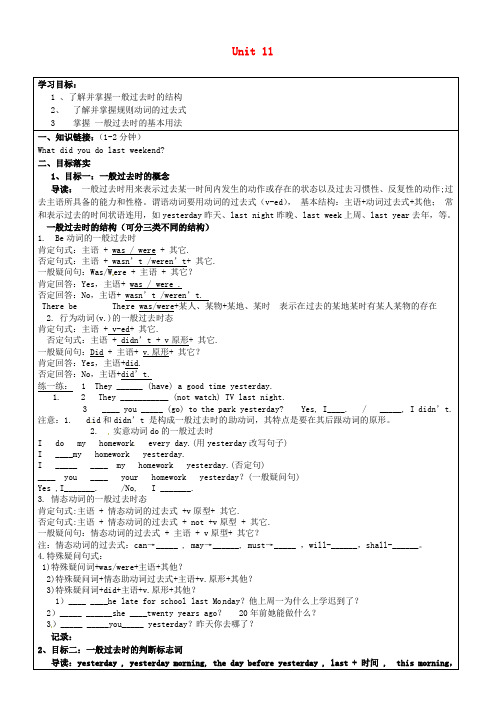
watch _______ live _______ play _______
start _______ use _______ stop _______
visit _______ taste _______ plan _______
一般过去时的结构(可分三类不同的结构)
1. Be动词的一般过去时
肯定句式:主语+was / were+其它.
否定句式:主语+wasn’t /weren’t+其它.
一般疑问句:Was/W ere +主语+其它?
肯定回答:Yes,主语+was / were .
否定回答:No,主语+wasn’t /weren’t.
There be The rewas/were+某人、某物+某地、某时表示在过去的某地某时有某人某物的存在
2.行为动词(v.)的一般过去时态
肯定句式:主语+v-ed+其它.
否定句式:主语+didn’t + v原形+其它.
一般疑问句:Did+主语+v.原形+其它?
肯定回答:Yes,主语+did.
否定回答:No,主语+did’t.
have (has)(有)_______ go(走)_______ see(看见)_______ get(变得,到达)_______
come(来)_______ feed(喂)_______ run(跑)_______ say(说)_______
buy(买)_______ eat(吃)_______ grow(生长)_______ ride(骑)_______
七年级英语下册 Unit 11 How was your school trip(第2课时)导学案
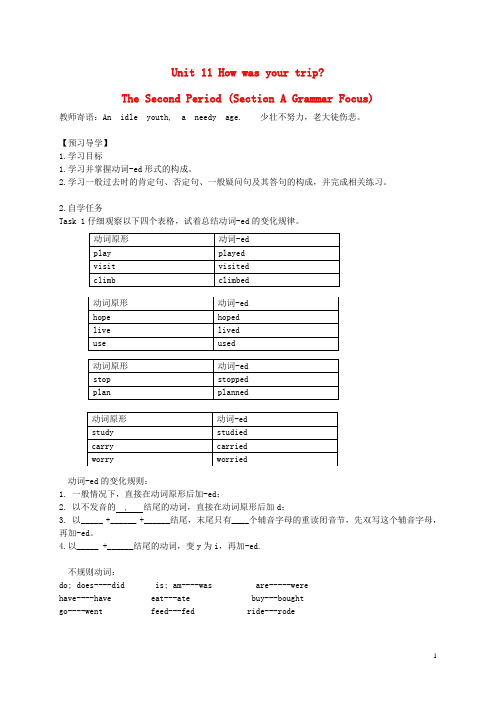
Unit 11 How was your trip?The Second Period (Section A Grammar Focus)教师寄语:An idle youth, a needy age. 少壮不努力,老大徒伤悲。
【预习导学】1.学习目标1.学习并掌握动词-ed形式的构成。
2.学习一般过去时的肯定句、否定句、一般疑问句及其答句的构成,并完成相关练习。
2.自学任务Task 1仔细观察以下四个表格,试着总结动词-ed的变化规律。
动词-ed的变化规则:1. 一般情况下,直接在动词原形后加-ed;2. 以不发音的结尾的动词,直接在动词原形后加d;3. 以_____ +______ +______结尾,末尾只有____个辅音字母的重读闭音节,先双写这个辅音字母,再加-ed。
4.以_____ +______结尾的动词,变y为i,再加-ed.不规则动词:do; does----did is; am----was are-----werehave----have eat---ate buy---boughtgo----went feed---fed ride---rodeTask 2 认真阅读以下文字,了解一般过去时态的定义。
一般过去时态(past indefinite tense )一、用法:一般过去时表示在过去某个特定时间发生,也可以表示过去习惯性、经常性的动作。
一般不强调动作的影响,只说明事情。
I had a word with Julia this morning. 今天早晨,我跟朱莉娅说了几句话。
I took a walk in the morning. 我曾经在早上散过步。
二、常用时间状语:yesterday,last week ,in the past, in 1993, at that time,once,before, a few days ago 等等Task 3 Grammar chart观察下面的两个表格,注意黑体字。
Unit 11 How was your school trip 第四课时 导学案
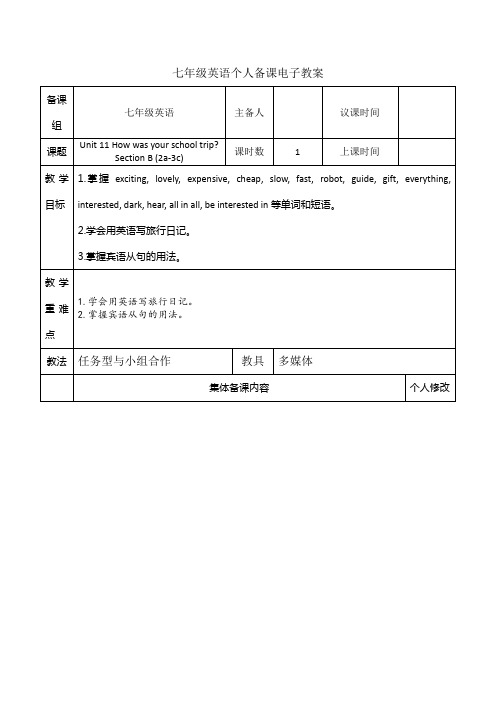
通过Free talk的形式导入新课,若学生有困难,提示学生可以用interesting, boring, great, terrible, exciting等词来回答。
Step2 Work on 2b&2c
Fast reading
Read the passage and find the answers to the following questions.
2.学会用英语写旅行日记。
3.掌握宾语从句的用法。
教学重难点
1.学会用英语写旅行日记。
2.掌握宾语从句的用法。
教法
任务型与小组合作
教具
多媒体
教
学
过
程
集体备课内容
个人修改
第四课时
Step1 Lead-in
T:Hello, everyone! Do you like traveling? How was your last trip?
时态:一般过点,人物和时间。
2.详细描述。详细讲述所参观的景点,以及在景点所进行的活动。
3.表达感受。对旅行做出评价,谈谈自己的感受。
Step4 Homework
完成本课时的同步练习册
教学反思
七年级英语个人备课电子教案
备课组
七年级英语
主备人
议课时间
课题
Unit 11 How was your school trip? SectionB(2a-3c)
课时数
1
上课时间
教学目标
1.掌握exciting,lovely,expensive,cheap,slow,fast,robot, guide, gift, everything, interested, dark, hear, all in all, be interested in等单词和短语。
资料春新人教版七年级下册unit11Howwasyourschooltrip导学案1
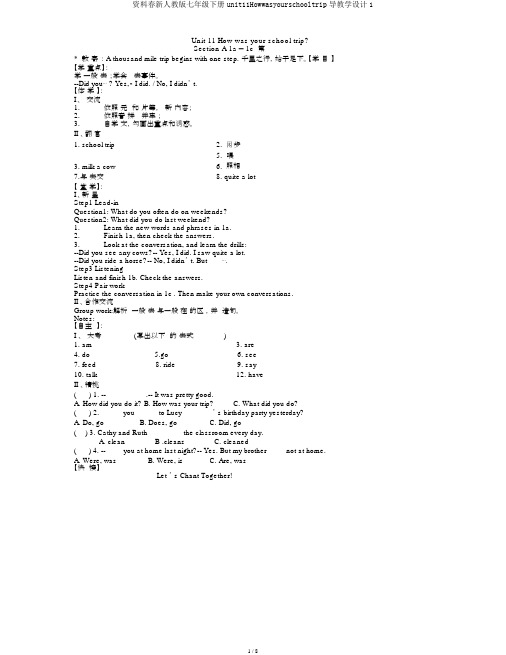
Unit 11 How was your school trip?Section A 1a — 1c 第*教寄: A thousand mile trip begins with one step. 千里之行,始于足下。
【学目】【学重点】:学一般去;学会去事件。
--Did you⋯? Yes,–I did. / No, I didn’ t.【体学】:I、交流1.依照元和片等,新内容;2.依照音拼并牢;3.自学文,勾画出重点和诱惑。
II 、翻官1. school trip_________________2.闲步 ______________________5.喂 ______________________ 3. milk a cow ________________6.照相 ______________________7.与夫交 ________________8. quite a lot __________________【堂学】:I、新呈Step1 Lead-inQuestion1: What do you often do on weekends?Question2: What did you do last weekend?1.Learn the new words and phrases in 1a.2.Finish 1a, then check the answers.3.Look at the conversation, and learn the drills:--Did you see any cows?-- Yes, I did. I saw quite a lot.--Did you ride a horse?-- No, I didn’ t. But⋯.Step3 ListeningListen and finish 1b. Check the answers.Step4 Pair workPractice the conversation in 1c . Then make your own conversations.II、合作交流Group work:解析一般去与一般在的区,并造句。
七年级英语下册导学案:Unit 11 How was your school trip(第1课时)
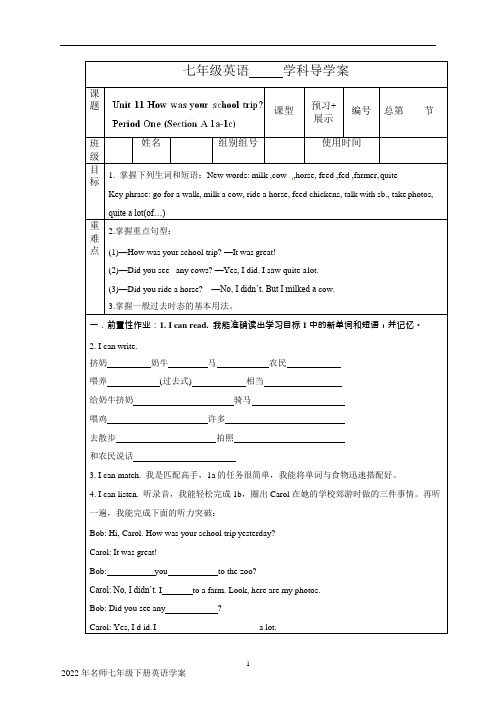
七年级英语学科导学案课题课型预习+展示编号总第节班级姓名组别组号使用时间目标1. 掌握下列生词和短语:New words: milk ,cow ,horse, feed ,fed ,farmer, quiteKey phrase: go for a walk, milk a cow, ride a horse, feed chickens, talk with sb., take photos, quite a lot(of…)重难点2.掌握重点句型:(1)—How was your school trip? —It was great!(2)—Did you see any cows? —Yes, I did. I saw quite a l ot.(3)—Did you ride a horse? —No, I didn’t. But I milked a cow.3.掌握一般过去时态的基本用法。
一.前置性作业:1. I can read. 我能准确读出学习目标1 中的新单词和短语,并记忆。
2. I can write.挤奶奶牛马农民喂养(过去式) 相当给奶牛挤奶骑马喂鸡许多去散步拍照和农民说话3. I can match. 我是匹配高手,1a 的任务很简单,我能将单词与食物迅速搭配好。
4. I can listen. 听录音,我能轻松完成1b,圈出Carol 在她的学校郊游时做的三件事情。
再听一遍,我能完成下面的听力突破:Bob: Hi, Carol. How was your school trip yesterday?Carol: It was great!Bob: you to the zoo?Carol: No, I didn’t. I to a farm. Look, here are my photos.Bob: Did you see any ?Carol: Yes, I d id. I a lot.Bob:_Did you ride a ?Carol: No, I didn’t. But I a cow.Bo b:Did you any chickens?Carol: Well, I saw some chickens but I didn’t feed them.Bob: What else did you do?Carol: My friends and I went for a walk around the farm and talked with a .5. 大声朗读以上对话,我能迅速背诵。
- 1、下载文档前请自行甄别文档内容的完整性,平台不提供额外的编辑、内容补充、找答案等附加服务。
- 2、"仅部分预览"的文档,不可在线预览部分如存在完整性等问题,可反馈申请退款(可完整预览的文档不适用该条件!)。
- 3、如文档侵犯您的权益,请联系客服反馈,我们会尽快为您处理(人工客服工作时间:9:00-18:30)。
Unit 11 How was your school trip导学案Unit11Howwasyourschooltrip?SectionA1a—1c*教师寄语:Athousandmiletripbeginswithonestep.千里之行,始于足下。
【学习目标】【学习重点】:学习一般过去时;学会谈论过去事件。
--Didyou…?–yes,Idid./No,Ididn’t.【体验学习】:I、预习交流.根据单元标题和图片等,预测新课内容;2.根据音标拼读单词并牢记;3.自学课文,勾画出重点和疑惑。
II、翻译官.schooltrip_________________2.散步______________________4.骑马_____________________5.喂鸡______________________kacow________________6.照相______________________7.与农夫交谈________________8.quitealot__________________【课堂导学】:I、新课呈现Step1Lead-inQuestion1:whatdoyouoftendoonweekends? Question2:whatdidyoudolastweekend?Step2Presentation.Learnthenewwordsandphrasesin1a.2.Finish1a,thenchecktheanswers.3.Lookattheconversation,andlearnthedrills: --Didyouseeanycows?--yes,Idid.Isawquitealot.--Didyourideahorse?--No,Ididn’t.But….Step3ListeningListenandfinish1b.checktheanswers.Step4PairworkPracticetheconversationin1c.Thenmakeyourownconversa tions.II、合作交流Groupwork:分析总结一般过去时与一般现在时的区别,并练习造句。
Notes:_____________________________________________ _______________________________________________________________ ______【自主检测】:I、时态大考验.am____________2.is_______________3.are_______________4.do____________5.go___________6.see______________7.feed___________8.ride____________9.say_______________0.talk__________1.take_____________2.have______________II、精挑细选1.--__________.--Itwasprettygood.A.Howdidyoudoit?B.Howwasyourtrip?c.whatdidyoudo?2.________you________toLucy’sbirthdaypartyyesterday?A.Do,goB.Does,goc.Did,go3.cathyandRuth________theclassroomeveryday.A.cleanB.cleansc.cleaned4.--________youathomelastnight?--yes.Butmybrother_________notathome.A.were,wasB.were,isc.Are,was【快乐链接】Let’schantTogether!Amiswas,Iwasfree.Hewasbusy.Arewere,arewere.youwerehappy.Theywerebored.Havehashad.Ihadaheadachebeforeeight.Saysaid,saysaid,Isaid"yes".Hesaid"no".Dodoesdid,Ididmyhomeworkyesterdaymorning.Gowent,gowent.Iwenttobedlatelastnight.【学习体会】成功&收获:失败&不足:Unit11Howwasyourschooltrip?SectionA2a—2d*教师寄语:Athousandmiletripbeginswithonestep.千里之行,始于足下。
【学习目标】【学习重点】:继续学习谈论过去事件。
--Howwasyourschooltrip?--Itwasexcellent/great/….--whatdidsb.do/see/say/…?--Luckyyou.【体验学习】:I、预习交流.根据图片和对话等,预测新课内容;2.根据音标拼读单词并牢记;3.自学课文,勾画出重点和疑惑。
II、翻译官.种苹果_____________________2.摘草莓____________________3.showaround_________________4.农场___________________5.钓鱼______________________6.看星星___________________7.在乡下_____________________8.Luckyyou._________________【课堂导学】:I、新课呈现Step1ReviewandLead-inQuickaction:Thephrasesin1aorthepastformsoftheverbs.Step2PresentationShowsomepictures,askandlearn.eg:--whatdidhe/shedo?--He/Shepickedsomestrawberries./…Step3Listening.Gothroughthesentencesin2a&2b.2.Listento2aandcheckthequestionsyouhear.3.ListenandcircleTorFin2b.Thenchecktheanswers.Step4Pairwork.Askandanswerquestionswithyourpartner.Finish2c.2.Role-playtheconversationsin2d.II、合作交流Groupwork:分析总结如何谈论过去事件,并模仿2d编写对话。
Notes:_____________________________________________ ________________________________________________________________ _______【自主检测】:I、最佳选择goshopping,practiceEnglish,playchess,watchamovie,do somereading.I___________inthelibrarylastweekend.2.Let’sgoto___________!Therearemanynewmoviesthesedays.3.jim___________lastnight,becausehehadanEnglishspee chcontestthismorning.4.Grandpaoften___________withhisfriendsintheafterno on.5.yesterdayI____________withmymotheratthemall.II、你来我往A:1._______________,Peter!B:Goodmorning,Alice!A:Alice,2._________________B:oh.Itwasgreat.A:3.____________________B:Iwenttothezoowithmyfriends.A:4.___________________B:wesawmonkeys,pandas,tigersandsoon.Thenwewenttothe parkandplayedgames.A:5.___________________B:yes,wehadagoodtime.A:Luckyou.【快乐链接】Riddle---谜底为SectionA出现的单词.Iamanimalkeptbyfarmerstoproducemilk.2.whatalwaysgoestobedwithhisshoeson?3.It’sverysmallinthesky,butit’sactuallyverybig.whatisit?【学习体会】成功&收获:失败&不足:Unit11Howwasyourschooltrip?SectionAGrammarFocus —3c*教师寄语:Athousandmiletripbeginswithonestep.千里之行,始于足下。
【学习目标】【学习重点】:、总结归纳SectionA部分语法重点;2、并将所学知识学以致用。
【体验学习】:预习交流.根据GrammarFocus,归纳SectionA部分语法重点;2.自学课文,勾画出重点和疑惑。
【课堂导学】:I、新课呈现Step1GrammarFocus.Giveasummaryaboutit.2.Trytoreciteit.Step2Presentation.Gothroughthelettersin3a.pletethetwoletters,thenchecktheanswers.3.Readtheletterstogether.Step4Groupworkmakeupastory.Eachstudentaddsasentence .eg:Student1:LastweekIvisitedmyaunt’shouse.Student2:Theweatherwasbeautiful.Student3:wewentfishing.Student4:….II、合作交流.Groupwork:总结归纳SectionA部分语法重点Notes:_____________________________________________ _______________________________________________________________ _______2.Groupwork:动词过去式归类规则动词:___________________________________________________ _____________________________________________________________________________________________________不规则动词:__________________________________________________ 【自主检测】:完形填空mr.andmrs.Taylorwereteachers.Theylivedinabig___1__. Lastyeartheywenttothecountrysidefortheirsummervacat ion.They___2__itverymuchbecauseitwasaquitecleanplac e.onedaytheywentfora___3_inthemorningandsawanoldman.Hesatinthe___4_suninfrontofhishouse.mr.Taylorwenttohimandasked,“Doyoulike___5inthisquietplace?”Theoldmananswered,“yes,I___6__.”mr.Taylorasked,“whatarethe___7__thingsaboutit?”Theoldmananswered “well,___8___hereknowseachotherwell.Theyoftencomet oseeme,andIoftengotovisit___9__,too.Also,therearelo tsofchildrenhere.”mr.Taylorsaid,“That’sinteresting.well,___10__ arethebadthings?”Theoldmanthoughtforashorttimeandsaid,“well,thesamethings.”1.A.cityB.housec.country2.A.learnedB.enjoyedc.played3.A.talkB.walkc.look4.A.coldB.cloudyc.warm5.A.readingB.livingc.sitting6.A.canB.amc.do7.A.goodB.cheapc.delicious8.A.nothingB.everyonec.noone9.A.himB.youc.them10.A.whatB.howc.who【快乐链接】一般过去时顺口溜动词一般过去时,表示过去发生的事;be用was或用were,have,has变had;谓语动词过去式,过去时间作标志;一般动词加-ed,若是特殊得硬记。
